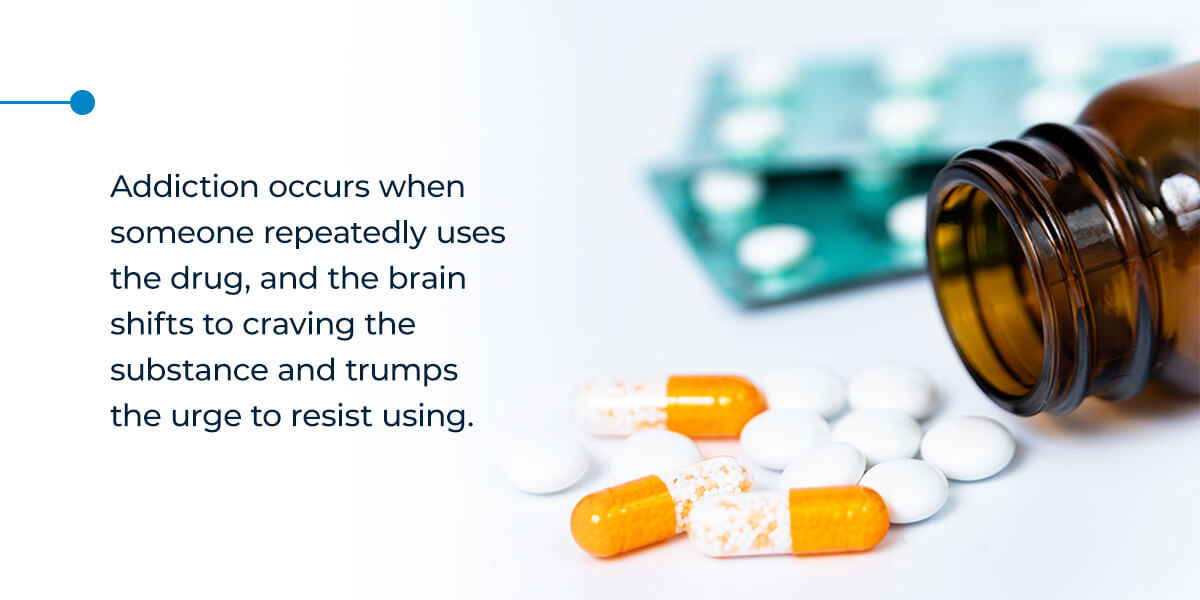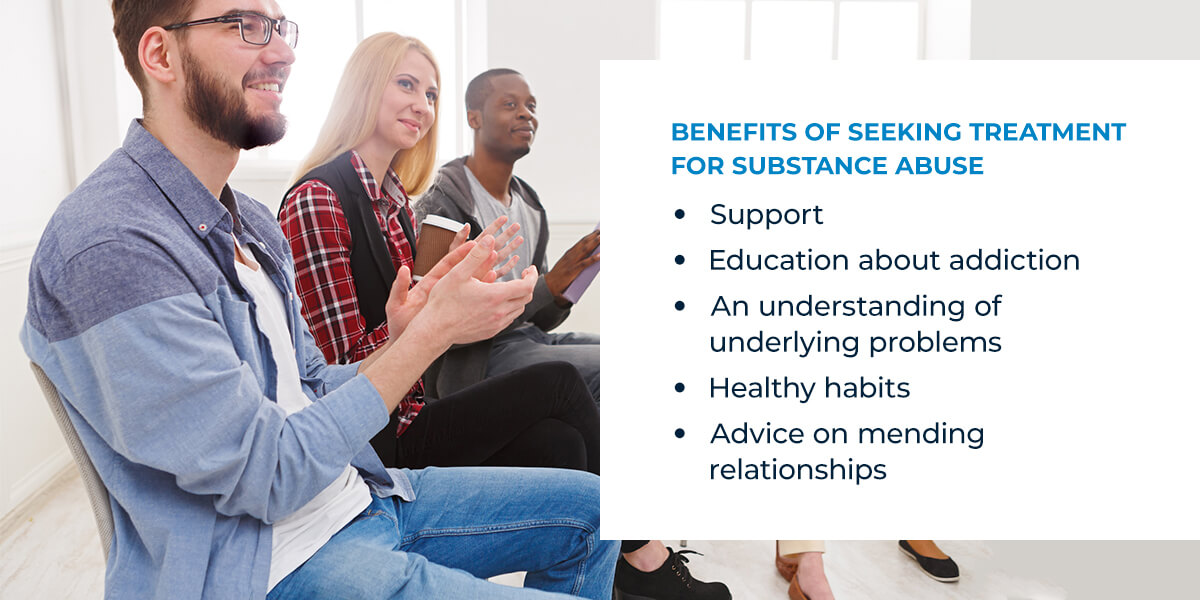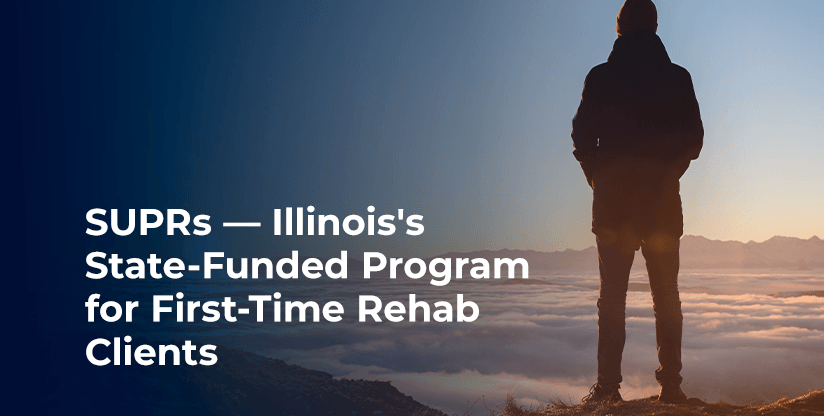
Drug misuse and addiction can impact the lives of many individuals in varying circumstances. Whether a coworker, friend, family member or you are struggling with addiction, finding drug misuse treatment options is a high priority for successful recovery. With all of the treatment options available, seeking out treatment for yourself or a loved one is possible for practically any person.
Recognizing signs of drug misuse in a loved one or in yourself can be challenging at first. But researching and finding resources to help you understand the process of addiction and how people’s lives can change because of drug misuse is a significant part of finding the best treatment options.
At Gateway Foundation, we understand the complexities of having an addiction to drugs and seeking treatment. Understand those complexities yourself with the symptoms, causes, effects and common questions of addiction.


Gateway Foundation offers customized, evidence-based recovery plans to support your recovery and ongoing healing.
People can fall into addiction for various reasons. With the widespread nature of drug addiction and drug misuse in the country, it’s helpful to be aware of the symptoms of drug addiction. Knowing these signs can help you determine if a loved one is using drugs and how that impacts important aspects of their life.
Some of the most common signs a person may exhibit when using drugs or experiencing addiction include:
Social and behavioral signs of a substance use disorder can include:
Physical signs of drug use can include:
Alcohol is one of the most commonly misused substances in the United States. With over 14 million people over the age of 12 experiencing alcohol use disorder, learning the signs of alcohol addiction is crucial to helping yourself or your loved ones recover.
The signs and symptoms of alcohol addiction can vary. People are sometimes referred to as “functioning alcoholics” and are seemingly fine on the outside. These people work hard to minimize the signs they show about their addiction, but over time, this cover-up can be difficult to continue.
Other people will exhibit more severe or noticeable signs and symptoms of alcohol use disorder. Some of the widely known signs of alcohol addiction include:
The general signs of drug use are helpful when determining whether someone is suffering from drug addiction. In addition to those symptoms and signs, some specific drugs bring out certain symptoms that can further help you see the signs of drug use in yourself or a loved one.
Here are some of the more specific signs of drug use for different types of drugs:
Drug addiction is a disease that many people deal with on a daily basis — over 19.5 million Americans aged 12 and up were affected by a substance use disorder in 2017. This chronic disease is described as a compulsion for seeking and using substances despite dangerous consequences. These individuals will lack the control to cease using the drugs or substances.
The first instance of using the substance is likely voluntary. Addiction occurs when someone repeatedly uses the drug, and the brain shifts to craving the substance and trumps the urge to resist using. This is why addiction is known as a relapsing disease.
People who have been in recovery for years may still be at risk of using the substance again. Between 40%-60% of those treated for substance use disorders had relapsed. Even when relapse occurs, it doesn’t mean that treatment options for addiction don’t work. Treatment always needs to be analyzed and tailored to a person so they can be on the road to recovery. That’s why at Gateway, we offer individualized substance misuse treatment to address individual recovery needs.
When a person starts using drugs, the brain’s reward system is activated because of the dopamine released. This reward system is beneficial when you’re happy from visiting with friends or enjoying delicious food, but activating it with drugs can start the unhealthy cycle of using drugs regularly.
As a person continues to misuse drugs, the brain will start getting used to the effects and reduce the response of cells in the reward system. They won’t feel the same euphoric high they once did, and they’ll begin using more of the drug until they achieve the effect they desire. This occurrence is commonly known as building a tolerance.
There isn’t a perfect formula for determining the type of person that’s going to become addicted to drugs, but there are a few life factors that can increase a person’s chances of falling into addiction. Here are the three risk factors that can enhance someone’s chances of becoming addicted to a substance:
Dealing with substance use disorder comes with short-term and long-term effects on overall health. The health effects a person experiences depend on the type of drug they use, how the drugs are taken, their health history and any other habits that can impact a person’s overall health and behaviors.
Short-term health effects can be noticeable after one use, while long-term effects can make themselves present months or years down the road. Learning about the possible health effects that your loved one or yourself can experience due to drug addiction is eye-opening information that can help make treatment sound more necessary.
Any drug, illegal or prescribed, can have short-term effects on a person. Individuals who are prescribed pain-relievers, like opioids, notice a decrease in their moderate or severe pain but may also experience shallow breathing or drowsiness. A person enjoying a glass of wine may feel intoxicated after and be tired or relaxed. It’s common for short-term effects to occur, but it can be life-changing when someone is using drugs daily.
Some short-term physical health effects from substances can include:
Other short-term effects that a person can experience impact their social and mental health. Some of these effects include:
Using drugs regularly can severely impact overall health. Some of the long-term effects that drugs can cause to the body can last for years or stick around forever.
People using drugs may not consider how these substances can impact them in the future. Handling the short-term effects may be possible, but the long-term effects of using drugs can impact nearly every organ in the body.
These long-term effects can carry from mild health concerns to life-threatening impacts to your body and your brain. Those include:
A serious health concern for individuals using drugs is increasing their risk of infectious disease. This risk is significantly heightened during opioid or injection drug use, according to the Centers for Disease Control and Prevention (CDC). Drug use is connected to individuals participating in risky behaviors like sharing needles.
Using drugs and living an unhealthy lifestyle can also weaken a person’s immune system, making them more susceptible to infectious diseases and making it difficult to fight off illnesses.
Diseases that are common among drug users whose method is injection include hepatitis and HIV. Drugs that can be taken through injection include heroin, cocaine, prescription opioids, methamphetamine and steroids.
Certain drugs can take a major toll on the heart. Some of the adverse effects that drugs can contribute to the cardiovascular system range from increased or decreased heart rate to a heart attack.
Stimulants can cause significant damage to the heart every time a person uses these drugs. Substances like nicotine, cocaine and methamphetamines are all stimulants that can potentially lead to heart disease or heart failure.
Drugs taken through injection needles can also cause damage to the cardiovascular system. Injections can lead to bacterial infections in blood vessels or collapsed veins from repeated use.
Various forms of cancer have been linked to drug use, including tobacco, vaping, marijuana and steroids. Smoking cigarettes can lead to cancer of the lungs, stomach, mouth and neck. One of the best ways to prevent developing these forms of cancer is ceasing nicotine or tobacco smoking.
Links have also been made between marijuana and the risk for testicular cancer in adult males. This risk is increased when adolescent males begin using marijuana in their early years.
Lung and respiratory damage are linked to substances like tobacco, cocaine, heroin, inhalants, marijuana, prescription opioids, DXM and more. Numerous respiratory issues can occur when individuals smoke or inhale drugs, introducing toxins and other substances to their lungs. An example of respiratory damage due to drugs is smoking crack cocaine and seeing severe pneumonia and lung inflammation.
Other examples include cigarette smoking leading to bronchitis and emphysema or using opioids and seeing worsened asthma symptoms or slow breathing.
Most drugs can cause stomach damage or intestine issues. A common symptom of drug use is nausea and vomiting, which can lead to acid reflux. Cocaine use is also known to contribute to gastrointestinal damage with bowel tissue decay and stomach pains. Opioid use has been shown to cause severe constipation and acid reflux.
Substances including prescription opioids, heroin, steroids and inhalants can all lead to liver damage when taken regularly. The damage these substances inflict on the liver can be intensified in combination with alcohol. Prolonged use of these substances can potentially lead to liver failure.
Some substances are known to potentially cause kidney damage or kidney failure, whether it’s directly or indirectly the reason. Kidney damage can result from the breakdown of muscle tissues, rise in body temperature and dehydration, which are all possible symptoms of substance use.
Drugs like steroids, PCP, inhalants and MDMA can cause damage to the musculoskeletal system. An example of this type of damage includes steroid use in early adolescence causing the body to tell the bones to stop growing because of the increase in sex hormones. In another example, PCP can cause intense muscle contractions.
Hormonal effects can occur from substances like steroids, heroin and other appearance- or performance-enhancing drugs that impact the body’s ability to produce hormones. Some symptoms of hormonal changes in the body can include infertility for men and body hair growth for women.
Substance use during pregnancy can cause serious health issues for both mother and baby. Drug use during pregnancy can lead to low birth weight for the baby, premature birth, miscarriage and various cognitive and behavioral development issues for the baby.
To prevent long-term health problems for the baby or the mother, a person who is pregnant should reach out for help and resources on the effects of substance use during pregnancy.
All addictive drugs make changes to the brain when used regularly. The neurological long-term effects of substance use can make a huge impact on the progression of addiction. Other than altering a person’s dopamine levels and furthering the disease of addiction, other neurological long-term effects include:
The changes in a person’s brain because of drug use can also lead to mental health problems, like depression, anxiety, paranoia and other mental illnesses. People who struggle with addiction are often diagnosed with mental illness, known as co-occurring disorders.
Drug-related overdose deaths are increasing every year. Research shows that one in four deaths can be traced back to prescription drug, alcohol, illicit drug and tobacco use.


Don’t let your substance use disorder continue to wreak havoc on your life. Start your recovery today.
People struggling with addiction can have a difficult time admitting they need help. If you or a loved one is dealing with addiction, it’s important to recognize the negative impact addiction is inflicting on your or their life.
People may decide against treatment because they believe they have control over their addiction or are waiting until they hit rock bottom. In reality, the best time to seek out treatment is as soon as you can, but know it’s never too late to find help.
Determining whether your or a loved one needs to seek out substance use treatment can be simple when you stop and take a closer look at behavioral health, life changes, relationships and other major substance-related signs and symptoms.
If a person is experiencing numerous negative effects to their life because of substance use disorder, it’s time to start considering treatment options. Addiction can range between mild, moderate or severe, and a person regularly using drugs may fall somewhere on this spectrum. A person can find out how severe the issue is by going over the following criteria:
The number of criteria points that apply to a person can determine the severity of their addiction. People experiencing any of these symptoms should try and seek treatment to improve their overall health and lifestyle.

Looking toward the road to recovery and searching for treatment is the best thing a person can do to address their substance addiction. Whether someone decides to seek treatment on their own or has assistance from their friends or family, it is a major accomplishment and the first step to becoming sober.
The type of treatment a person needs depends on the severity of their addiction to drugs. Learn about the various types of treatment options people can seek out when they want to recover from addiction, which we offer at Gateway Foundation:
Treatment can also include various types of therapy programs. Attending therapy sessions is a helpful method for patients to continue to talk about their feelings and thoughts on their recovery process. Some therapy programs at Gateway Foundation include:
Treatment for addiction is different for every patient. While treatment plans can vary, many individuals can expect to complete four phases of treatment to reach recovery. The four phases include intake, detox, treatment and ongoing recovery care.
The four phases of addiction treatment are necessary to help a patient heal and find healthy coping methods after struggling with addiction.
The first step of the treatment process at Gateway is admissions and assessment. The patient will meet with a licensed professional to talk about their treatment options and learn more about the patient’s life and addiction severity. This will help us come up with the best treatment plan based on the person’s emotional, medical and social aspects. The professionals at Gateway may have the patient take psychological, medical and psychosocial assessments to further improve their treatment plan.
The next step in the treatment program is detox. The symptoms of withdrawal can be intense depending on a person’s dependency on a substance. Medically assisted detox is a helpful treatment option to help lessen the symptoms. Our medical team will assess a patient’s risks during withdrawal and plan for certain medical interventions or additional treatments to help the patient progress through the withdrawal process.
Treatment options range depending on a patient’s specific needs. Some patients may require more time and supervision after detox and enroll in an inpatient treatment center. Inpatient treatment is great for removing people from their old habits and lifestyle and introducing them to healthy lifestyle changes.
Patients who need to take care of loved ones or resume life obligations can attend outpatient treatment. This is a great choice for those who are recovering from more mild addiction issues.
Patients may seek therapy options in combination with inpatient or outpatient treatment. Individual therapy, group therapy, family therapy and rehabilitation therapy can be a helpful or necessary addition to the recovery process.
The last phase of treatment is ongoing recovery. This step is important because recovery continues throughout a person’s lifetime. While a patient can become stronger mentally and physically after treatment, it’s important to ensure all of their hard work continues throughout their life. Follow-up programs at Gateway like support groups or therapy are helpful for many patients looking to continue a substance-free life.
Taking the leap to seek out treatment is a huge accomplishment for any person with a substance use disorder. While the road to recovery has ups and downs, the benefits of getting treatment for addiction outweigh any of the challenges.
Some of the benefits of substance use treatment include:


Don’t let your addiction continue to poison your life. Start your recovery journey today.
Substance use and addiction treatment are complex topics. Learn more through some of the most frequently asked questions regarding substance use treatment.
Substance use treatment centers like Gateway Foundation can treat drug addiction for various substances. Treatment services and programs vary depending on the substance and the person. Some people may require minimal treatment, while other treatment plans are more extensive.
If you are looking for treatment options near you in Illinois, Gateway Foundation has 16 locations throughout the state. You can find the location closest to you if you’re seeking treatment for yourself or another person.
Medications are a helpful treatment option for some patients in combination with counseling and therapy. Medications like Vivitrol and Suboxone can be included in a patient’s treatment plan if necessary. Medication-assisted treatment programs can help patients recover from alcohol, opioids and other sedatives. Medications may also be used during withdrawal management.
There is currently no cure for substance use disorder. Substance use disorder is a relapsing illness, so the best way to recover is through managing addiction through treatment programs, therapy and ongoing care. Substance use treatment is an effective method for patients to gain control over their lives.
The cost of treatment varies between treatment centers for drug addiction and programs. Cost is a big point of discussion when considering treatment. Reach out to treatment facilities and look into insurance coverage to determine what treatment plans work best for your budget.
Reaching out for substance use disorder treatment, whether it’s for yourself or someone you care about, is a step in the right direction. Learn more about the treatment options Gateway Foundation has to offer and the quality care our staff provides. Contact us today for resources on addiction and inquiries about our treatment programs.


Receive high-quality care for methamphetamine addiction treatment from Gateway Foundation, one of the nation’s leading rehab facilities. With 16 locations in Illinois to choose from, patients can find a nearby treatment center to start their recovery process. Contact us today to learn more about our programs and services for achieving lifelong freedom from addiction.


